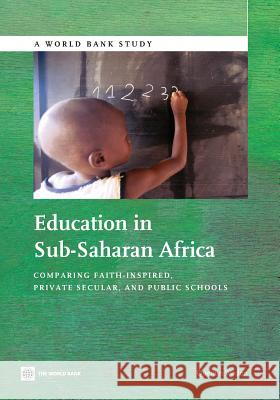Education in Sub-Saharan Africa: Comparing Faith-Inspired, Private Secular, and Public Schools » książka
Education in Sub-Saharan Africa: Comparing Faith-Inspired, Private Secular, and Public Schools
ISBN-13: 9780821399651 / Angielski / Miękka / 2014 / 156 str.
Education in Sub-Saharan Africa: Comparing Faith-Inspired, Private Secular, and Public Schools is part of the World Bank Studies series. These papers are published to communicate the results of the Bank's ongoing research and to stimulate public discussion. The purpose of this study is to build a stronger evidence base on the role of faith-inspired, private secular, and public schools in sub-Saharan Africa using nationally representative household surveys as well as qualitative data. Six main fi ndings emerge from the study: 1. Across a sample of 16 countries, the average market share for faith-inspired schools is at 10-15 percent, and the market share for private secular schools is of a similar order of magnitude. 2. On average, faith-inspired schools do not reach the poor more than other groups; they also do not reach the poor more than public schools, but they do reach the poor signifi cantly more than private secular schools. 3. The cost of faith-inspired schools for households is higher than that of public schools, possibly because of a lack of access to public funding, but lower than that of private secular schools. 4. Faith-inspired and private secular schools have higher satisfaction rates among parents than public schools. 5. Parents using faith-inspired schools place a stronger emphasis on religious education and moral values. 6. Students in faith-inspired and private secular schools perform better than those in public schools, but this may be due in part to self-selection.











